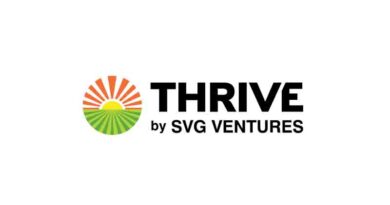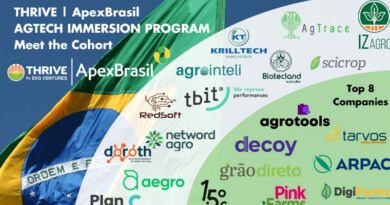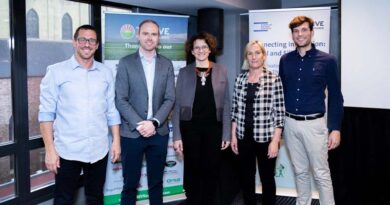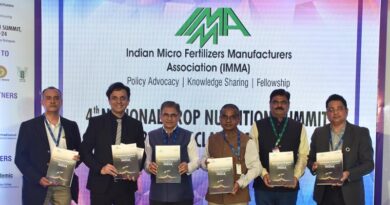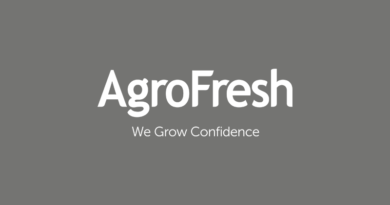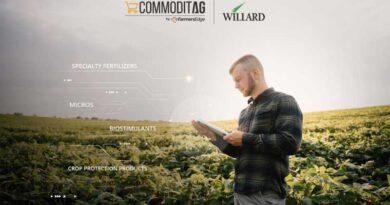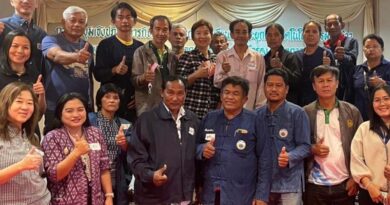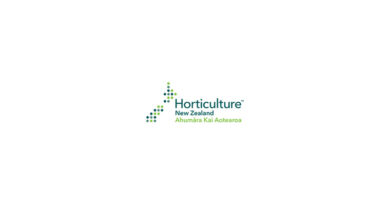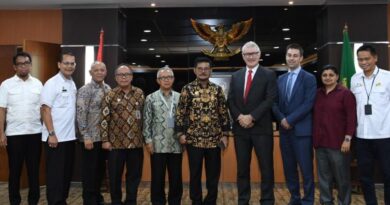ApexBrasil and SVG Ventures | THRIVE partner to showcase Brazilian sustainable agribusiness during the World Agri-Tech Innovation Summit 2024 in California
The event takes place from March 19 to 20 in San Francisco and will bring together leaders from the agricultural sector, think tanks, investors, startups and innovative companies to discuss trends and opportunities in the agricultural technology sector
15 March 2024, California: In recent years, Brazil has developed a vibrant digital agriculture ecosystem, with the potential to improve the efficiency and productivity of global agriculture, while reducing the costs and environmental impacts of the activity. In order to make this scenario more widespread, the Brazilian Trade and Investment Promotion Agency (ApexBrasil) will be holding a technical seminar during the World Agri-tech Innovation Summit (WAIS) 2024 which will take place from March 19 to 20 in San Francisco, California (USA). The annual conference aims to promote debate on trends and opportunities in the world’s agricultural technology sector. For Brazil, the event is an opportunity to reinforce the country’s position in the context of the low-carbon economy.
In addition to technical presentations involving the Secretary for Innovation, Sustainable Development, Irrigation and Cooperatives (SDI) of the Ministry of Agriculture, Livestock and Supply (MAPA) and the Brazilian Agricultural Research Corporation (Embrapa), ApexBrasil selected three national startups to present the potential of Brazilian agricultural technology to the select audience of invited investors and opinion formers.
The startups Ecotrace (www.ecotrace.info), which works with traceability in the food chain; Muda Meu Mundo (www.mudameumundo.com.br), focused on empowering rural landowners in commerce; and Moss Earth (MCO2 Token – MOSS Earth), dedicated to the carbon credit market, are the Brazilian companies taking part in the event with the support of ApexBrasil. At the event, these companies will have the opportunity to present their solutions to potential clients and investors interested in the technology and international trade of their products.
One such opportunity will be participation in private side events held by SVG Ventures|THRIVE, a leading AgriFood innovation and investment platform headquartered in Silicon Valley. With a community of over 10,000 startups from 100 countries, plus more than 30 corporate partners, SVG invests, accelerates, and creates unparalleled access for entrepreneurs to scale globally and solve the biggest challenges facing the food and agriculture industries.
In addition to hosting private events, SVG Ventures|THRIVE will manage an investor lounge at WAIS to bring together startups, scaleups, and corporates seeking sustainable agriculture collaboration and growth opportunities globally. Founder & CEO John Hartnett will also present the THRIVE Global Impact Investment Report in partnership with Pitchbook on the main stage, which examines agtech investment trends in 2023 and offers insights into the future of the global agricultural technology sector in 2024 and beyond.
According to ApexBrasil, the aim of participating in WAIS is to broaden the international dialog, promoting the strength of Brazilian agribusiness, which accounts for approximately 25% of the country’s Gross Domestic Product (GDP). At the same time, the event is another opportunity to reinforce the country’s position as an agricultural powerhouse, presenting new opportunities to business partners, opinion formers and international investors, supported by the dissemination of the technological, innovative and scientific aspects present in Brazilian agricultural production.
“In this context, it is important to spread the historical perspective that, in four decades, Brazil has been able to create a sustainable and competitive model of tropical agriculture, unparalleled in the world,” says André Müller, Agribusiness Manager at ApexBrasil. “Today we have more than twenty research and technological development hubs spread throughout the country, and more than two thousand startups focused on solutions for agriculture – the agritechs,” says Müller.
Thematic axes
Brazil’s participation in WAIS 2024 will focus on two main areas: climate change, with an emphasis on what Brazil has been doing to reconcile agricultural production, environmental sustainability and a low-carbon economy; and technology for sustainable agriculture, showing the potential of agritechs and technological solutions to promote and ensure the sustainability of agriculture through innovation. The aim is to stimulate dialog with opinion leaders on this issue in the United States.
The choice of these themes reflects an agenda that converges with the strategies for the State of California, where concerns about the effects of climate change and the search for clean and renewable energy solutions are at the forefront of public debate. Likewise, given the Bay Area’s high technological profile, the role of technology in sustainable development will be highlighted, a theme that mobilizes efforts and attracts interest from Silicon Valley companies, universities and startups.
“Carbon projects have their own particularities, depending on the methodology to be used and the integration between technologies, the production chain and management. In this scenario, ApexBrasil has sought to promote projects that integrate new technologies and that can influence the way agriculture is currently carried out in Brazil, bringing improvements to agriculture by reducing emissions or increasing the carbon stock in the soil, encouraging, for example, new crop rotation practices, soil cover, bringing efficiency in the use of water and fertilizers. This is an agenda that has convergence and potential for trade and technical cooperation between Brazil and the USA,” said André Muller.
Brazil’s potential
A McKinsey study shows that Brazil has the potential to account for 15% of global carbon capture opportunities through Nature-Based Solutions (NBS). The same study estimates that the global market for carbon credits should jump from US$ 1 billion in 2022 to US$ 50 billion in 2030. The estimate for Brazil is that the revenue generated by this activity will be US$7.5 billion a year by 2030, just from credits obtained by natural means. It is worth noting that in the context of climate change, nature-based solutions are a set of actions that reduce or remove greenhouse gas emissions while protecting and restoring natural and modified ecosystems, which benefits people and nature at the same time.
According to carbon credit emission data certified by Verra (www.verra.org), Brazil is the third largest emitter of AFOLU (Agriculture, Forestry and Land Use) credits in the world, behind Indonesia and Peru.
Brazil, Peru and Colombia form a bloc that represents 38% of the total AFOLU carbon credits issued by Verra, mainly from REDD+ projects in the Amazon, and ⅔ of all NBS project credits issued in 2023 – considering all the existing certifiers in the world. Brazil currently accounts for 13% of all credits issued and has enormous potential for implementing and offering ARR and ALM projects.
California and Brazil
The economy of the State of California is the largest in the United States, representing approximately 14% of the country’s total Gross Domestic Product. If it were an independent country, it would be the fifth largest GDP in the world ($3.6 trillion in 2023), according to the Bureau of Economic Analysis.
The San Francisco Bay Area is the largest and most influential global technology center. Silicon Valley, in particular, is the most important innovation ecosystem in the world and is home to some of the most valuable high-tech companies today, such as Apple, Google, Meta, Nvidia, Intel, among others. It has a dynamic environment of research centers, universities, laboratories, investment funds, startups, incubators and accelerators in the most diverse sectors and accounts for almost a third of all venture capital investment in the United States. It is also the world leader in the number of unicorns and decacorns. By way of comparison, according to Forbes, among the 50 most promising new private artificial intelligence companies in the country, 34 are in the Bay Area or Silicon Valley.
Less well known is the fact that the state of California is the largest agricultural producer in the US and accounts for approximately 13.5% of the country’s agricultural revenue, with an emphasis on fruits, nuts, vegetables and legumes. California’s Central Valley is one of the most productive agricultural regions in the world, with around 230 crops grown in the region. In the area of organic products, California is responsible for 36% of all US production and the sector continues to grow. Due to its scale and arid climate, the agricultural sector uses around 40% of California’s water consumption, also affecting the level of groundwater pollution, which represents a sustainability challenge that the authorities are seeking to resolve.
California is Brazil’s main trading partner in the United States and its main trade surplus with the country. However, there is still ample room for increasing trade relations in both directions. In 2022, California exported more than US$1.4 billion to Brazil, notably transportation equipment, computers and electronic products, chemical products and non-electrical machinery. California, on the other hand, imported US$ 6.2 billion from Brazil in 2022, especially oil and gas, primary metal manufactures and processed foods.
Also Read: No pump and no hassle with the new Demand® CS insecticide 10-gallon drum from Syngenta
(For Latest Agriculture News & Updates, follow Krishak Jagat on Google News)


